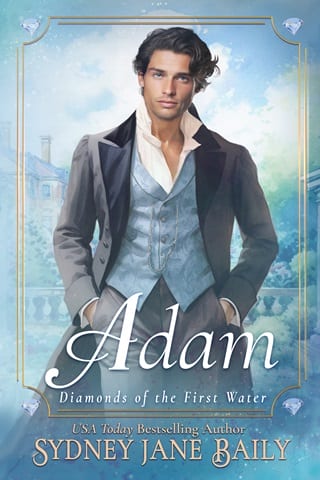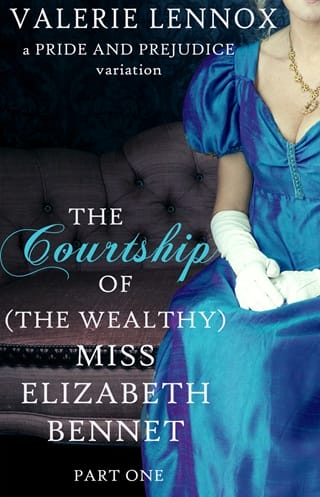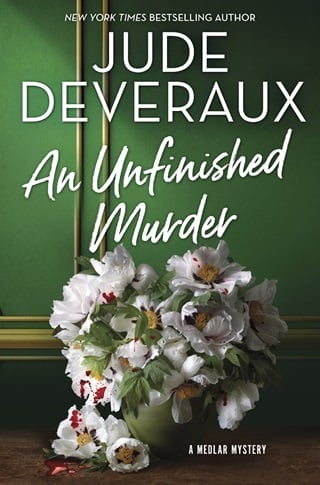Chapter One
London, 1846
“ U pstairs,” Alice ordered the two young ladies in her charge. They were spoiled by their mother. But they were also smart and eager to learn whatever Alice could teach them. They rarely talked back, nor complained when made to conjugate French verbs or practice the violin.
Today was going to be a geography lesson followed by a discussion in French, and as their governess of the past two years, Alice was proud of the girls’ progress. Their education had been less than satisfactorily handled by the ones who came before her. And their eldest sister, Susanne, who was now out in society and eager to marry, suffered from a distinct lack of learning.
Luckily, the young lady in question was also sweet and pretty, but Alice felt badly at how few significant thoughts Susanne had in her head. Moreover, she was unable to speak a second language, nor play an instrument. She was, in a word, uncivilized.
On the other hand, the eldest Beasley daughter had her entire life ahead, full of promise, with every door open and every opportunity still afforded her. Alice, taking her seat in the salon they used for lessons, had grown up with the best education money could buy, and her future had fallen like an unfortunate squirrel down a well. Despite being the only offspring of a depleted, nearly bankrupt earl — at low tide , as her mother called it — Alice’s prospects were now limited to working as a governess for Lord and Lady Beasley’s daughters until they outgrew her.
Then, with an ounce of luck, Alice hoped she would find another position equally fulfilling with younger children who would need her longer. Then she could settle into the next household, perhaps for a decade.
And after that? Maybe another situation of equal length before she could retire to the country in a small, tidy cottage.
It sounded pleasant. Not the least bit dreadful, dreary, and tedious, she promised herself. And after the drama of her own early twenties, she ought to be glad of a calm respite — for the rest of her life.
So why did she want to put her head into a pillow and scream, at least once every day?
“Mrs. Malcolm,” Pauline got her attention. “Would you please speak to my mother about piano lessons again? I think I prefer the pianoforte to the violin.”
Alice smiled to herself. What Pauline had liked about her previous lessons was how the teacher used to doze off and let her do nothing.
“Since I cannot play it well,” Alice told her, “Lady Beasley would have to hire another teacher for your music lessons. If she is willing, then I will find a suitable piano instructor who will make you learn your scales and practice daily so you can become proficient.”
“Oh,” Pauline said before sniffing and sitting back in her chair, looking instantly disinterested. The girl wasn’t lazy exactly, but she did like to take the easy way whenever possible. Sadly, she had no innate talent for a musical instrument.
“Well, I prefer Mrs. Malcolm,” Pauline’s sister, a year younger, declared. Leila had a better knack for the violin. However, her French accent was atrocious no matter how well she handled the grammar.
Alice only wished she could convince Lady Beasley to allow her to instruct Susanne on the rudimentary knowledge she ought to have learned. The last time they spoke about it, Lady Beasley had been adamant.
“Susanne is the prettiest of my three girls. Thus, she won’t need the other skills necessary to capture a husband.”
Skills like basic mathematics, knowing Spain from Germany, or being able to have an informed discussion about anything other than textiles. But Alice had been forced to give up.
As if she’d conjured the buffle-headed young lady whose only interest was in fashion and how attractive she looked, Susanne appeared at the door.
“Mother has a favor to ask you, Mrs. Malcolm,” the brown-haired eldest Beasley daughter said.
Alice frowned. She was rarely summoned by Lady Beasley, who trusted Alice completely by this time with her younger daughters’ education. Rising, she considered the best use of their time while alone.
“Come up with a discussion you might wish to have upon traveling to the Continent or meeting with a visitor from France.”
“Is he a male visitor?” Pauline asked.
Alice, who knew how the mind of a female on the cusp of womanhood worked, nodded. “If you wish, then yes. Pretend you are the dining companion of a handsome man whom you wish to impress. Leila, you can be the gentleman. When I get back, you two shall present your dialogue to me.”
“Like a play,” Leila said with an enthusiastic clap, not minding being the male lead. “Bonjour, mademoiselle,” she said to her sister.
Alice nodded and followed Susanne downstairs to Lady Beasley’s private salon where she was writing her daily correspondence and taking tea.
“ Ah , there you are, Mrs. Malcolm.”
She said it as if Alice had been off gallivanting around instead of in her normal place upstairs, tutoring the girls.
“You wished to speak with me,” Alice said, sitting without being asked. It was a nasty habit, but she had been born and raised as a titled lady. In her daily dealings with others, it was sometimes difficult to remember how far she had fallen in her station.
Lady Beasley briefly frowned at the governess taking a seat, but then she got to the point.
“I shall not be able to accompany Susanne to the ball.”
“Which ball, my lady?” Alice wondered at her ladyship assuming she had any idea of the social schedule of Bath’s finer people.
“Two nights from now at the assembly rooms.”
“I see.” Alice waited, wondering what it had to do with her.
“I would like you to be her chaperone.”
Oh dear! Alice tamped down the instant apprehension. This was her life now, hardly above that of a servant. And as if she were an old married woman or someone’s mother, she was being called upon to observe a young lady’s manners and protect her virtue.
If only someone had done that for her!
She would refuse. It was not in her employment description, and it would cause her personal discomfort to be thrust into a situation that was as familiar as breathing, but in which she no longer belonged. Moreover, in such a situation, there was the danger of being recognized.
Susanne had stayed in the room to listen. Now she spoke up with genuine enthusiasm.
“How fun it will be for you, Mrs. Malcolm, to see all the lovely gowns and to listen to the music. I know how you love music.”
“Nearly as much as you love gowns,” Alice said to her without malice. “However, I do not believe I can attend.”
“If additional pay is the issue,” Lady Beasley began, causing Alice’s cheeks to heat.
“No, my lady.” Although she would accept any extra wages since she saved every penny. The sooner she had enough, the sooner she could retire to the country — in twenty years or so.
“I only ask because I will, in fact, pay you well to attend my Susanne. I trust you implicitly, Mrs. Malcolm, not to be foolish or flighty or let my daughter take the smallest of risks.”
Alice tried to breathe steadily. Even if she could bear the reminder of her life that once was...
“I have nothing to wear to a ball,” she pointed out. The two women in the room would be surprised to see the wardrobe she had owned merely two years earlier. Gowns of satin and fine silk for dancing with dukes and dining with earls and even for falling prey to a debauched viscount.
“We shall take care of that,” Lady Beasley insisted. “If one of Susanne’s dresses does not fit you, then we shall go to the dressmaker on Pulteney Bridge. She nearly always has something already sewn that can be tightened with a ribbon or two at the waist. Luckily, you are neither unusually short nor unbearably tall, but as perfectly proportioned as my own girls.”
The comparison was nearly accurate except for two items. The Beasley females were on the daintier, less fulsome side of the scale, whereas Alice took after her own mother, who was exceedingly shapely when it came to her bosom.
In any case, at the mere thought of entering a ballroom, she was beginning to feel queasy.
“Is there not a close friend of yours, my lady, who would be more suitable, someone accustomed to the social life of Bath?”
“I wish there was, but on short notice, I can think of no one I can ask. Susanne could attend with a friend, but I do not trust that another girl’s mother will look after her as her own. She might become distracted. Worse, I have heard of someone letting a young lady stray with the specific intent of her ruin.”
Alice gasped as if she’d been found out. Susanne gasped at the awful notion.
“Mother!” she exclaimed. “Who would do such a thing on purpose?”
Lady Beasley sighed. “You are so lovely and na?ve, dear girl. And you have a titled father and a large dowry. You can have any man in Bath or, next year, in London. Many others cannot say the same thing. Thus, your competition may try to get rid of you in any manner they can.”
Alice could barely breathe. Then, all at once, she blurted, “I shall chaperone her!”
Indeed, she would. Lord and Lady Beasley had given her employment on the basis of a fraudulent letter of recommendation and treated her with kindness. What’s more, Lady Susanne was all wide-eyed innocence. Alice would rather be flayed alive before she let the girl experience anything like what had happened to her.
The matter was settled. When she climbed the stairs to the salon, she could hardly credit she was going to attend a ball at her age, in her circumstances, as a chaperone!
Adam alighted from a sedan chair in front of his mother’s friend’s townhouse on The Paragon, a street running parallel to the River Avon. He thought the river itself, one of five Avons in England, to be an interesting phenomenon, winding narrow and long for seventy-five miles, yet only traversing nineteen miles westward from its source to its mouth, all the way to Portishead. It spilled into the Severn Estuary and the Bristol Channel.
Adam considered life to be much like the River Avon, or at least he hoped it would be — taking him through many and varied places and, of course, being many long years, like his grandparents, all four of whom were still living.
In any case, he liked to try new things, such as the wretched sedan chair, a box suspended on two poles. His mother had told him the chair used to be much in fashion in Bath when she was a girl, not only for the infirm but as a for-hire conveyance. Its popularity was currently giving way to a wheeled version. Thus, the Countess Diamond had advised him to try it before it vanished forever like the unfortunate dodo bird.
“You will feel like a foreign emperor from India or China,” she’d said.
He felt like a damn fool!
Arriving at Lord and Lady Beasley’s home after a far shorter journey than the River Avon’s, he vowed never to climb into such an embarrassing, uncomfortable contraption again. The two chairmen had been quick enough after he’d hailed them outside his residence on the Royal Crescent, but the journey made him shake like a dried pea inside a baby’s rattle. Not only did his teeth clack together, but his head banged side to side every time the shorter chairmen took a step.
Besides, the whole experience of being carried by two other chaps — yelling to everyone to move aside with “Chair, ho!” — made him feel like a pompous arse the entire way.
At his mother’s request, he had agreed to a visit with the Beasley family, and naturally, there were daughters involved. An honest woman, Countess Caroline Diamond had confessed her old friend had three of them, although only one of them was of marriageable age.
Lady Diamond’s friend from her youth, Lady Beasley was attractive and intelligent, and his mother assumed the eldest daughter would have at least those traits. Thus, he had dropped off his calling card days earlier upon his arrival in Bath and been invited to tea.
A rap on the door gained him entrance by a short butler, who ushered him into the drawing room. His hostess would be with him shortly.
Adam surveyed the room, grandiose with robin’s egg blue wallpaper and enough white painted molding to fell a forest. It looked rather like his own parents’ house. Then he heard music, not the pianoforte that his sisters played but a richly resonant violin. A tad introspective and solemn, rather than bright and lively, however.
Unable to help himself, he followed the music through the doorway at the far end of the drawing room into a smaller salon set up for reading and then into another. The violinist had her back to him and was staring out the window, playing from memory.
Wishing he hadn’t been so forward, since now he was alone with a female, Adam suddenly knew he’d seen her before. By her hair, he believed she was the lady from the street whose package he’d recovered. And at once, he also realized she must be the eldest daughter.
His mother had done him a good turn. He admired Lady Susanne already. Besides being lovely, she must be clever indeed to play so well.
Waiting silently while she finished, he was pleased to listen and to observe her. He’d experienced an instant attraction days earlier but feared he would have to wait until the first assembly to see her again. He had even returned each day to the same stretch of street, to no avail. Yet here she was.
As soon as the last notes died out, he spoke.
“Good day, my lady. I am sorry to intrude.”
She whirled around to face him. The expressions flickering across her face were easy to decipher — alarm, confusion, and then recognition.
“How did you get in here?”
“I was invited,” Adam said. “I am pleased to meet you. I am Lord Diamond.”
Her eyes widened slightly, and then she offered a polite curtsy.
“I believe you have mistaken me, my lord.”
“On the contrary. In fact, I have kept my eyes open for you while strolling Great Pulteney Street ever since our last encounter.”
Before he could say more, footsteps and voices came behind him. He turned to see the woman who must be Lady Beasley and another of her daughters. They were alike as two peas, with brown hair, soft brown eyes, and round cheeks with pleasant smiles. Apparently, the eldest daughter with the violin took after her father, for she had lighter hair, different color eyes, and sculpted cheekbones.
“There you are, young Diamond,” Lady Beasley said.
He bowed to her. “It was rude of me to have left the drawing room, and my mother would take me to task, but I heard your daughter’s exemplary violin playing and followed it like a sheep to a shepherdess. I am enchanted.”
The two females looked at one another, and then the younger one laughed while her mother shook her head.
“You mean Mrs. Malcolm,” Lady Beasley said, gesturing with a wave of her hand. “She isn’t my daughter. She is the governess to my two younger daughters.”
The governess! He nearly winced at his mistake. Her bearing was not what he expected a governess to have. Moreover, on the day he’d seen her, she had appeared to be accompanied by a lady’s maid when, really, she was one of two household staff out for a stroll.
What a dunce!
“You are correct, my lord,” the daughter added. “Mrs. Malcolm plays heavenly. I love to listen, too.”
“ This is my daughter, Lady Susanne,” Lady Beasley introduced her.
The young lady eyed him openly with her coffee-colored gaze.
“It is a pleasure to meet you,” he said. Adam did not let his disappointment show, but she seemed like a child compared to the governess and no wonder. Mrs. Malcolm was a married woman!
“Let us retire to the drawing room,” Lady Beasley said. “Tea will have been served by now.”
She preceded her daughter, but Adam hung back. Turning around, he faced the woman who still stood there, having watched and listened and been ignored by her employer. She had not been invited to tea at any rate.
Mrs. Malcolm remained composed with a certain sophic air about her. Adam would say she had a worldly quality, as if older than her years. Not that he knew her years.
“You are staring, my lord.” She said it as factual, not as a reprimand.
It was true.
“My apologies.” He was merely rearranging his preconception of her from a lady of the household to an employee. “Again, I am sorry I intruded and for mistaking you to be a...”
He trailed off, stopping himself from saying she was not a lady but simply a regular woman. That definitely was not coming out well.
“A member of the family,” he finished, watching her suck her cheeks in slightly, accentuating her cheekbones while appearing irritated.
“Your tea will be growing cold, my lord.” She raised her violin once again to her shoulder and turned her back on him.
 Fullepub
Fullepub 



